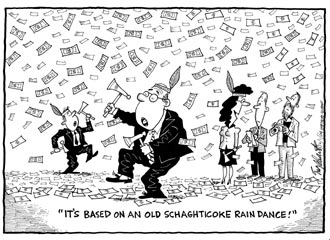 Another Stereotype of the Month entry:
Another Stereotype of the Month entry:
 Another Stereotype of the Month entry:
Another Stereotype of the Month entry:
01:00 AM EDT on Tuesday, August 3, 2004
We on this page have supported Rhode Islanders' right to vote on a casino, and still do, strongly. But the Harrah's casino proposal that will probably appear on the November ballot is no way to do this.
The constitutionality of the question is very much in doubt. It would be better to delay a vote until the next election than to have one on so questionable a proposal. At the very least, Rhode Island Secretary of State Matthew Brown should have waited to get an advisory opinion from the state Supreme Court on the debatable language of the Harrah's bill before ordering it on the ballot.
The governor's argument against placing this bill on the ballot stems from a 1973 provision in the state constitution prohibiting all "lotteries" except those that are state-operated. "Lottery" has been interpreted by the courts to include games of chance, such as those at a casino. (We realize that this might also leave in question the constitutionality of the proposed casino, and even the quasi-casinos in Newport and Lincoln, which are private, although the state theoretically operates their slot machines.)
The full-bodied, industrial-strength Harrah's casino would, of course, be run by that Las Vegas company, with the association of the Narragansett Indian Tribe as a kind of beard — a way of elicting sympathy among the Rhode Island voters. Since the disastrous passing of the U.S. Indian Gaming Regulatory Act, in 1988, casino companies have sought out (and even sought to help invent) assorted tribes as cover to let the companies set up shop in areas with many sucker sheep to be shorn, with much of the wool to be shipped backed to Vegas and other home cities of this "economic development." Meanwhile, local politicians are brought into the fold. Some of them even go to work for the casino companies! (We know readers will find that hard to believe.)
Fine. Let the people decide. But let's at least have enough respect for the law to make sure that what's going on the ballot is constitutional. Surely, even the vast promotional budgets of enterprises such as Harrah's don't trump that, too.
Mencken said that democracy is "the theory that the common people know what they want and deserve to get it good and hard." Let's make sure that they know what they're getting here. For instance, is it legal?
Rob's reply
The editorial says, "Since the disastrous passing of the U.S. Indian Gaming Regulatory Act...." Disastrous for whom, I wonder? Certainly not for any tribe that has undertaken gaming.
The chief stereotype here is the assertion that "casino companies have sought out (and even sought to help invent) assorted tribes as cover to let the companies set up shop...." In other words, that Indians are naive simpletons whom the casino companies are taking advantage of. Or worse, that frauds and phonies are claiming Indian status so the companies can reap profits off them.
Actually, cases of federal recognition are few and far between, and tribes that get recognized must pass rigorous inspection. For more on the subject, see Benedict: Schaghticoke, Eastern Pequot Tribes Are "Bogus".
Related links
The facts about Indian gaming
|
. . . |

|
All material © copyright its original owners, except where noted.
Original text and pictures © copyright 2007 by Robert Schmidt.
Copyrighted material is posted under the Fair Use provision of the Copyright Act,
which allows copying for nonprofit educational uses including criticism and commentary.
Comments sent to the publisher become the property of Blue Corn Comics
and may be used in other postings without permission.